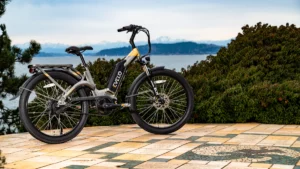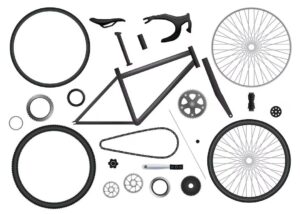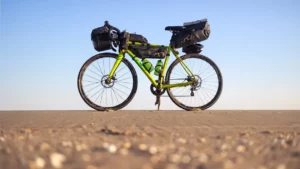La bonne cassette pour votre vélo peut sembler écrasante, surtout lorsque l'on considère le débat entre un 12 vitesse contre 11 système de vitesse. Ces options ne sont pas seulement des nombres mais des choix pivots qui affectent votre efficacité de conduite, confort, et l'expérience globale. Que vous soyez un cycliste chevronné ou un nouveau venu au vélo, Il est essentiel de comprendre les subtilités des cassettes 11 vitesses et 12 vitesses. Cet article plonge dans leurs nuances, vous aider à prendre une décision éclairée adaptée à vos besoins cycliques.
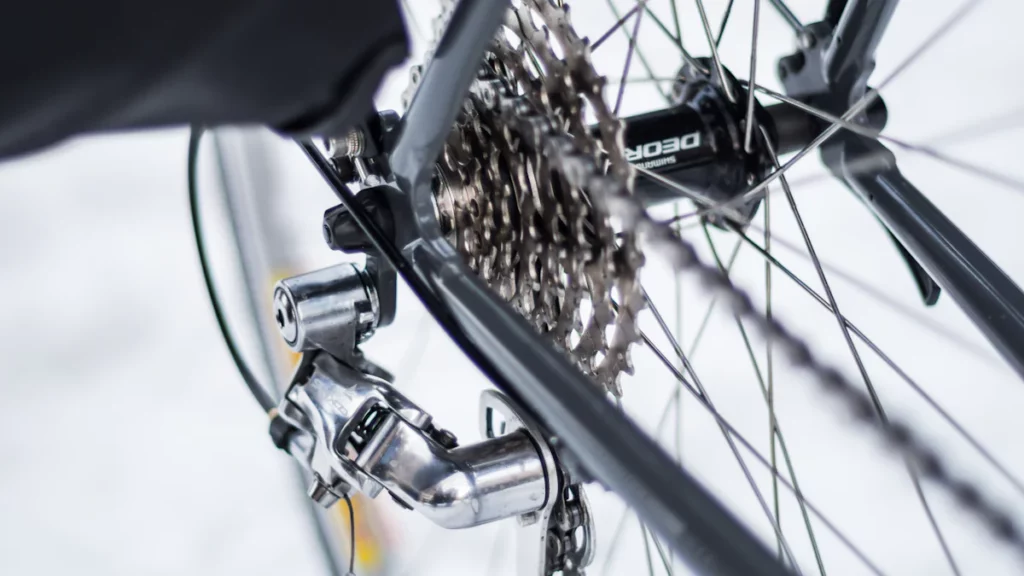
11 Cassette de vitesse
Un 11 Speed Cassette est un composant de vélo avec 11 Papettes montées sur le moyeu de roue arrière. Cette conception permet un changement en douceur et une distribution de puissance optimale sur divers terrains. Les caractéristiques clés incluent une gamme d'équipement équilibrée, poids plus léger par rapport aux cassettes à plus grande vitesse, et compatibilité avec un large éventail de disciplines cyclables.
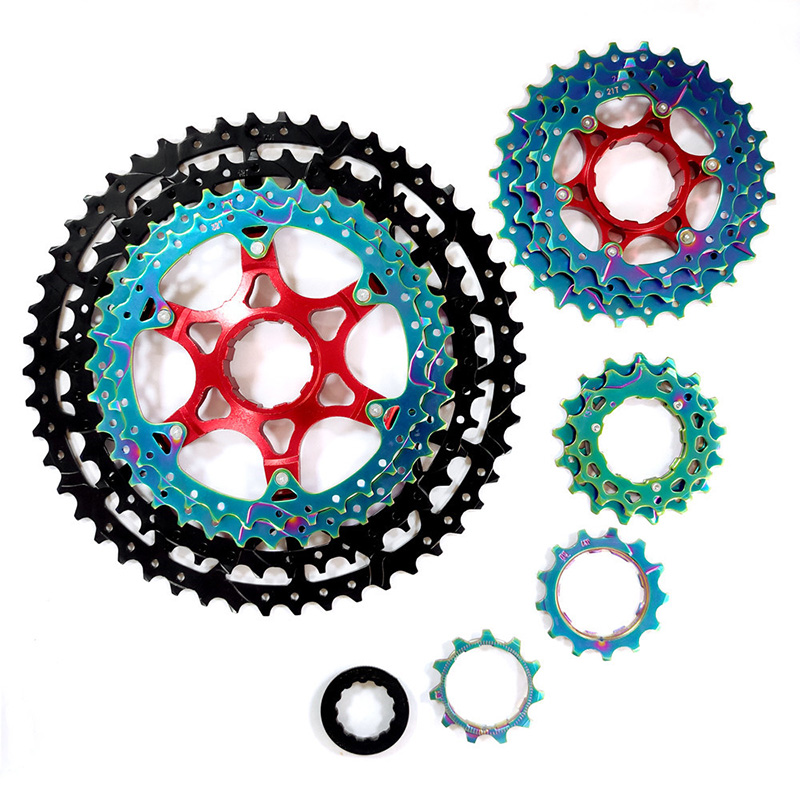
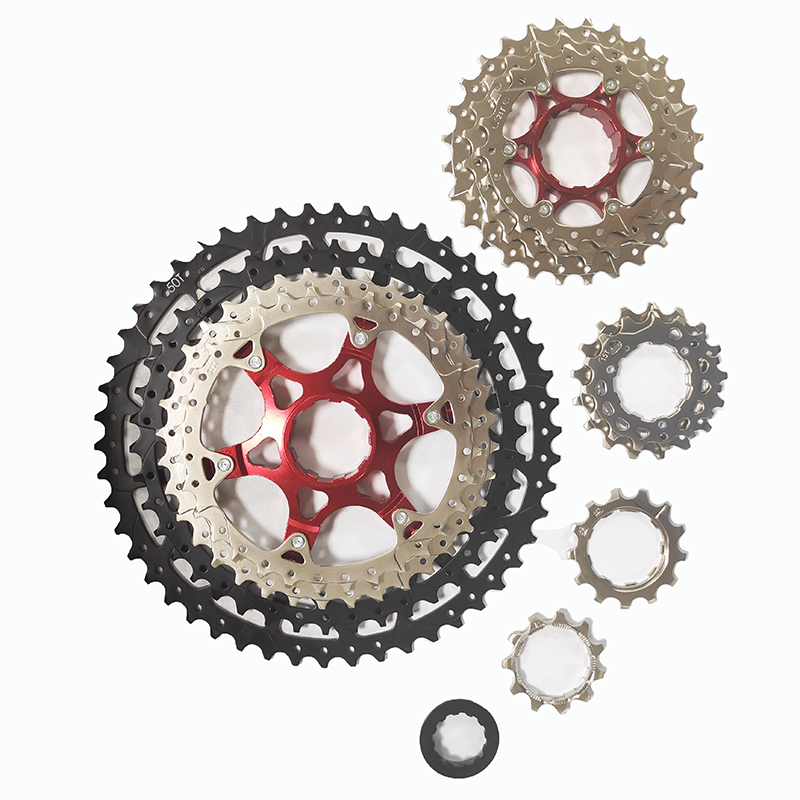
Par exemple, Un éclat bientôt 11 Speed 11-50T MTB Cassette est fort et fiable. C'est compatible avec Shimano 11-vitesses. Cela le rend polyvalent sans perdre des performances. Pour le mettre sur un corps Freehub Shimano Hg11 Road, Vous avez besoin d'une entretoise de 1,85 mm pour 11-36, 11-42, et 11-46 cassettes. Si ce n'est pas sûr de votre type Freehub, Gardez une entretoise à portée de main. Ces cassettes s'adaptent également sur un corps libre à 10 vitesses. Cela les rend bons pour la mise à niveau tout en gardant de vieilles roues arrière.
Quel est l'avantage d'un 11 Cassette de vitesse?
La cassette à 11 vitesses propose une gamme équilibrée de vitesses qui rendent le changement lisse et efficace, Vous aider à aborder différents terrains avec facilité. C'est plus léger qu'un 12 vitesses, ce qui peut faire une différence notable lors de l'escalade des collines ou de l'accélération.
De nombreux cyclistes apprécient sa simplicité et sa fiabilité, car il nécessite moins de maintenance et est plus facile à régler. Vous vous demandez peut-être s'il fournit suffisamment de vitesses pour des manèges difficiles - reteste, Une cassette à 11 vitesses offre de nombreuses options pour le VT et le VTT, vous donner la flexibilité dont vous avez besoin sans la complexité supplémentaire.
Est 11 Speed Worth LT pour MTB?
Absolument, Une cassette à 11 vitesses en vaut la peine pour le VTT. Il offre une gamme d'équipements robuste et polyvalente qui peut gérer les diverses demandes de cyclisme tout-terrain. Voici quelques raisons et données détaillées pour soutenir cela:
- Gamme de vitesses: Le système à 11 vitesses fournit généralement une plage de vitesse de 11 à 42 dents ou même plus large, Vous permettant de vous attaquer à des ascensions raides et à des descentes rapides avec facilité.
- Poids et efficacité: Une cassette à 11 vitesses est plus légère qu'un 12 vitesses, qui peut être crucial pendant les longues montées et les manœuvres techniques. Une transmission plus légère signifie moins de poids pour porter la montée, contribuant à une meilleure efficacité globale.
- Entretien et coût: La simplicité d'un système à 11 vitesses se traduit par une maintenance plus facile et une baisse des coûts. Les pièces comme les chaînes et les dérailleurs sont généralement moins chers et plus largement disponibles. Selon une enquête de Bikeradar, De nombreux coureurs préfèrent le 11 vitesses pour son équilibre entre la performance et l'entretien.
Quand utiliser?
Une cassette à 11 vitesses est idéale pour un large éventail d'activités de cyclisme. Il comprend:
- Terrain mélangé à vélo
- Vernieur routier récréatif
- Course de compétition
- Vélo de montagne général
- Promenades à longue distance
12 Cassette de vitesse
UN 12 La cassette de vitesse comprend 12 Papettes montées sur le moyeu de roue arrière, Fournir une large gamme de rapports d'équipement. Les caractéristiques clés incluent des incréments de vitesse plus fins pour un changement plus lisse et plus précis et une gamme de vitesse élargie pour s'attaquer à divers terrains. Par rapport à 11 vitesse, Il est idéal pour exiger des conditions de cyclisme.
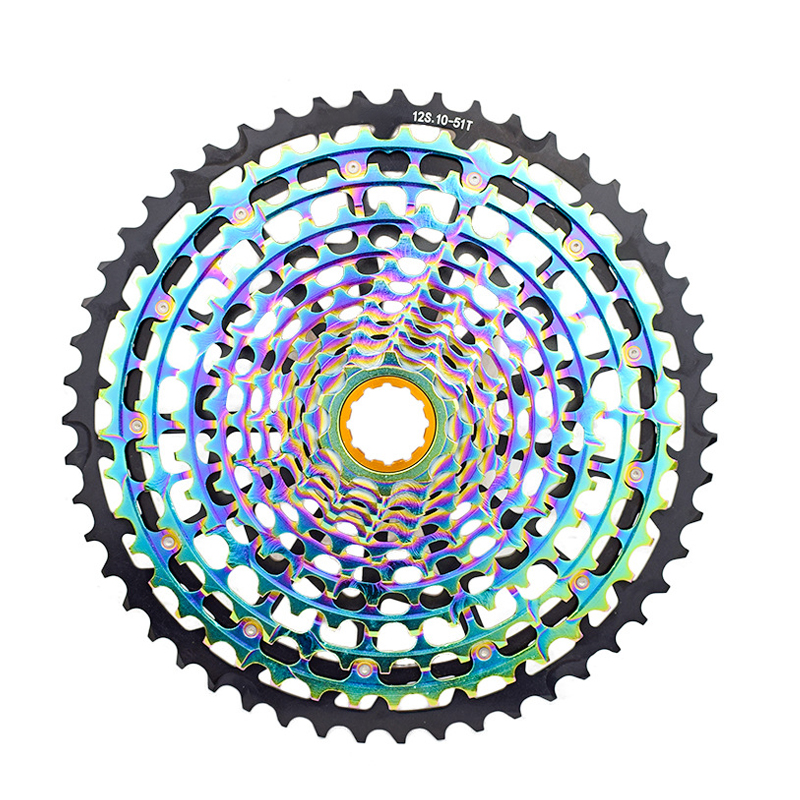
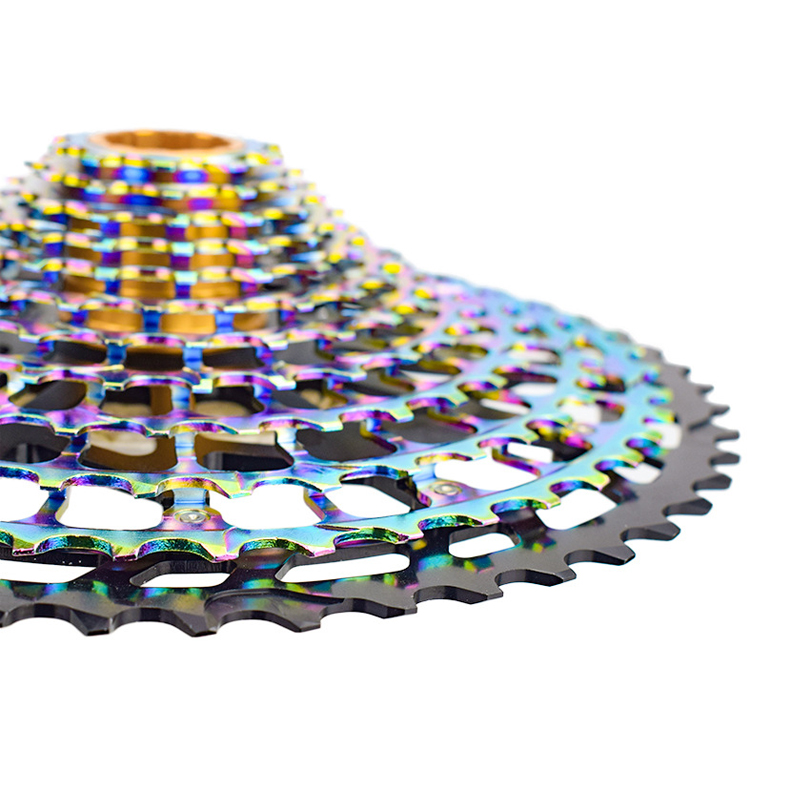
Si vous êtes après des performances de haut niveau pour votre vélo de montagne, ne cherche pas plus loin que le 12 Vitesse 10-51T MTB Cassette compatible avec le système SRAM XD. Cette cassette change la donne, Offrir un design léger mais robuste qui n'est pas seulement fonctionnel mais aussi magnifique dans les couleurs arc-en-ciel. Sa structure creux réduit le poids sans sacrifier la force, Assurer des changements d'équipement lisses et précis. Plus, Vous pouvez même l'obtenir sur mesure.
Quel est l'avantage d'un 12 Cassette de vitesse?
Une cassette à 12 vitesses propose une gamme de vitesses élargie avec des incréments plus petits entre les engrenages, Fournir des changements plus lisses et plus précis. Cela peut améliorer les performances sur des terrains variés, Permettre une cadence et une efficacité énergétiques optimales. Les ratios de vitesse les plus fins sont particulièrement bénéfiques pour maintenir un rythme constant sur les ascensions et les descentes.
Est 12 Speed Worth LT pour MTB?
Oui, Une cassette à 12 vitesses en vaut la peine pour le VTT. Il offre une gamme de vitesses plus large, ce qui est avantageux pour s'attaquer, sentiers techniques. Les étapes plus petites entre les engrenages permettent un meilleur contrôle et des transitions plus lisses, ce qui peut être crucial pour remettre en question les terrains tout-terrain. Bien qu'il puisse avoir un coût plus élevé, Les avantages de la performance justifient souvent l'investissement pour les vététistes sérieux.
Quand utiliser?
Une cassette à 12 vitesses est idéale pour diverses activités de cyclisme difficiles. Il comprend:
- Sentiers de montagne techniques et escarpés
- VTAT des montagnes compétitives
- Riders à la recherche de performances et de contrôle optimaux
- Des promenades hors route longues et difficiles
Quelle est la différence entre un 11 Vitesse et 12 Cassette de vitesse?
Différents choix entre une cassette à 11 vitesses et à 12 vitesses peuvent avoir un impact significatif sur votre expérience de cyclisme. Décomposons les principales différences dans leur nombre de vitesses, douceur de la douceur, compatibilité, et les exigences de maintenance pour vous aider à décider.
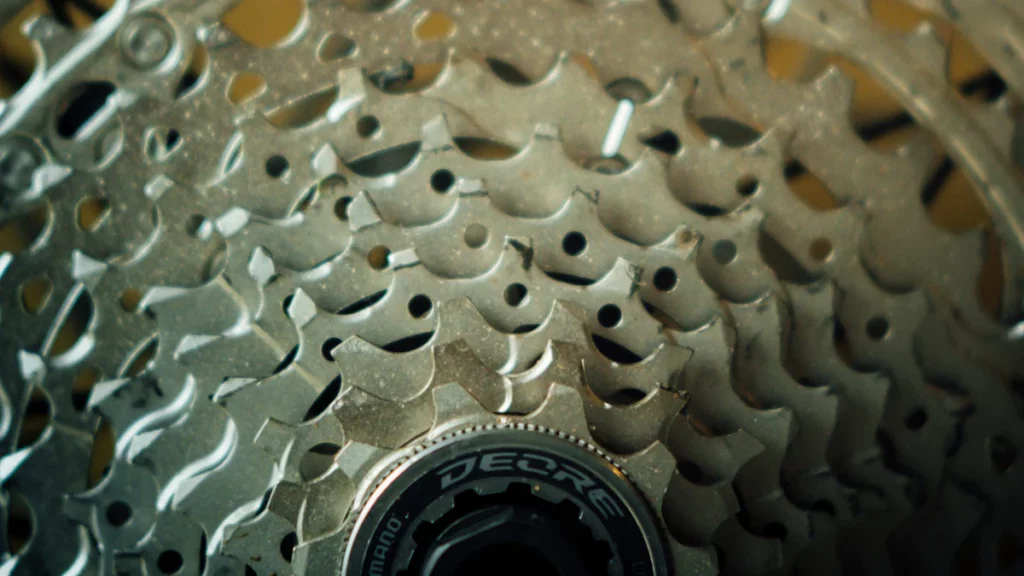
Nombre de vitesses
La différence la plus simple et la plus clé entre 11 vitesses et 12 Cassettes de vitesse est le nombre de vitesses. Une cassette à 11 vitesses 11 pignon. En revanche, Une cassette à 12 vitesses comprend un pignon supplémentaire, totalisation 12.
Cet équipement supplémentaire offre une gradation plus fine entre les rapports de vitesse, Permettre des ajustements plus précis. Par exemple, Une configuration commune à 11 vitesses pourrait avoir une plage de vitesse de 11-42 dents, tandis qu'un 12 vitesses pouvait s'étendre de 10-51 dents, offrant à la fois un basse vitesse inférieur et une vitesse supérieure supérieure.
Douceur de la douceur
Quand il s'agit de changer de douceur, La cassette à 12 vitesses surpasse généralement la 11 viande. Les espaces plus petits entre les engrenages dans un système à 12 vitesses permettent des transitions plus fluides et moins choquées, particulièrement perceptible pendant les ascensions et les sprints.
La recherche et les révisions des utilisateurs mettent fréquemment à mettre en évidence l'expérience de changement de vitesse améliorée avec des configurations à 12 vitesses. Par exemple, La technologie Hyperglide + de Shimano dans des cassettes à 12 vitesses permet un changement transparent même sous la charge, Une mise à niveau notable sur les homologues à 11 vitesses.
Compatibilité
La compatibilité peut être un facteur important pour décider entre les deux. Une cassette à 11 vitesses est plus compatible avec une gamme de vélos et de composants existants. De nombreux vélos sont en stock avec des transmissions à 11 vitesses, rendre les mises à niveau simples et rentables.
D'autre part, Une cassette à 12 vitesses nécessite souvent des composants spécifiques tels que les dérailleurs, chaînes, et dessectes conçues pour gérer la chaîne la plus étroite et l'espacement plus serré. Par exemple, La mise à niveau vers un système à 12 vitesses peut nécessiter de remplacer le corps FreeHub par un pilote XD ou un micro spline, Selon la marque.
Exigences de maintenance
Les exigences de maintenance diffèrent entre les systèmes à 11 vitesses et à 12 vitesses, principalement en raison de la complexité et de la précision de l'équipement supplémentaire. Un système à 11 vitesses est généralement plus facile à maintenir et plus indulgent en termes d'usure. Les composants sont légèrement plus robustes, et les lacunes plus importantes entre les engrenages peuvent tolérer plus de désalignement avant la dégradation des performances.
Inversement, 12-systèmes de vitesse, Tout en offrant des performances supérieures, nécessitent des soins plus méticuleux. La chaîne plus étroite et l'espacement des engrenages plus étroits signifient que même l'usure ou le désalignement mineur peut conduire à une dégradation notable des performances changeantes. Entretien régulier, comme des contrôles de chaîne fréquents et des ajustements précis, devient plus critique avec une cassette à 12 vitesses.
Quelle est la différence entre Shimano, SRAM, et briller bientôt cassette?
Lorsque vous choisissez une cassette pour votre vélo, Comprendre les différences entre Shimano, SRAM, Et briller bientôt est crucial. Explorons les performances et la durabilité distinctes pour vous aider à prendre une décision éclairée.
Performance
Shimano est réputé pour son changement précis et fiable, avec leurs cassettes à 12 vitesses comme le Shimano XTR offrant des transitions de vitesse lisse et des performances cohérentes dans diverses conditions.
SRAM, d'autre part, excelle avec sa technologie innovante, comme l'architecture X-Dome trouvée dans leurs cassettes Sram Eagle, qui offre une rigidité exceptionnelle et un changement propre même dans les terrains les plus difficiles.
BRILLER BIENTÔT, Bien que moins connu, concurrence en offrant des performances à un prix plus abordable. En tant que Fabricant et fournisseur de cassettes à vélo, Il produit souvent des ratios de vitesse et des conceptions compatibles avec les marques établies, En faire une option viable pour les cyclistes soucieux du budget. Si vous voulez de gros, étiquette privée, ou fabrication contractuelle, Ses solutions personnalisées à guichet unique ont tout ce que vous avez couvert.
Durabilité
Les cassettes Shimano sont construites avec des matériaux de haute qualité et une ingénierie avancée, Assurer des performances durables. Par exemple, Les cassettes XT de Shimano utilisent un mélange d'aluminium, titane, et l'acier pour équilibrer le poids et la durabilité.
Cassettes Sram, en particulier leurs modèles haut de gamme comme le XX1 Eagle, sont construits à l'aide d'une conception en acier usinée en une seule pièce, ce qui améliore considérablement leur durée de vie et leur résistance à l'usure.
Briller bientôt les cassettes offrent une durabilité respectable. Pendant leur processus de production, Ils utilisent des matériaux robustes comme l'aluminium, acier, et alliage, qui offrent une durée de vie plus longue par rapport aux autres options budgétaires.
Comment choisir la bonne cassette à vélo: 11 contre 12 Cassette de vitesse
Une cassette à vélo de correspondance parfaite peut améliorer considérablement votre expérience de cyclisme. La décision entre un 11 vitesse et un 12 La cassette de vitesse dépend de vos besoins et préférences spécifiques. Plongeons-nous dans les considérations clés.
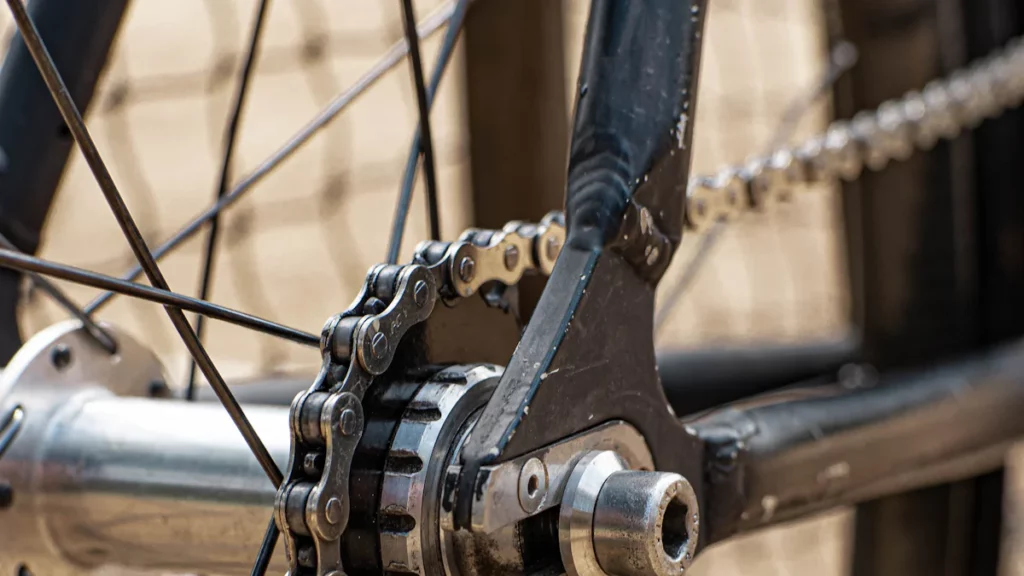
Quand choisir 11 Cassette de vitesse
- Mises à niveau soucieuses du budget: Si vous recherchez une mise à niveau abordable qui offre un solide boost de performances, La cassette à 11 vitesses est une excellente option. C'est plus facile sur le portefeuille et les composants sont largement disponibles.
- Simplicité et entretien: Le système à 11 vitesses est plus simple et nécessite une maintenance moins méticuleuse. C'est idéal pour les coureurs qui préfèrent un sans tracas, Configuration fiable.
- Compatibilité: Cette cassette est polyvalente et peut être utilisée avec des corps libres à 11 vitesses et à 10 vitesses, En faire un excellent choix pour ceux qui ne veulent pas remplacer plusieurs composants.
Quand choisir 12 Cassette de vitesse
- Sentiers techniques et raides: La cassette à 12 vitesses excelle sur les terrains difficiles avec sa gamme de vitesse plus large et ses incréments plus fins. Il offre un meilleur contrôle et des transitions plus lisses, crucial pour le vélo de montagne technique.
- Performance optimale: Pour les cyclistes sérieux qui recherchent la meilleure performance, Le système à 12 vitesses offre une douceur et une efficacité de changements supérieurs. L'équipement supplémentaire permet des ajustements plus précis et une meilleure entretien de cadence.
- À l'épreuve du futur: Si vous planifiez à long terme et que vous souhaitez vous assurer que votre configuration reste de premier ordre, Investir dans la cassette à 12 vitesses en vaut la peine. Malgré le coût initial plus élevé, Ses fonctionnalités avancées justifient l'investissement pour les cavaliers dédiés.
Pouvez-vous mettre un 12 Cassette de vitesse sur un 11 Vélo de vitesse?
Comme l'explique la mécanique de Sunrace, “Vous pouvez mettre une cassette à 12 vitesses sur un vélo à 11 vitesses, Mais cela doit être fait avec soin. L'espacement des engrenages doit correspondre à un changement en douceur. La mise à niveau vers une cassette à 12 vitesses peut améliorer vos manèges, Surtout sur les sentiers difficiles.”
En plus, Les cavaliers du Forum SingletrackWorld partagent également leurs réflexions sur l'utilisation d'une configuration à 11 vitesses:
- Mieux pour les trajets quotidiens
- Dure plus longtemps car les petits rouages sont plus faciles à remplacer
Donc, Bien que le passage à une cassette à 12 vitesses présente des avantages, Garder un système à 11 vitesses peut être plus simple pour le vélo de tous les jours. Mais si vous voulez mettre à niveau votre vélo avec 12 cassette de vitesse, Des modifications supplémentaires sont nécessaires. Ceux-ci peuvent inclure la mise à niveau du dérailleur, sortichons, Et potentiellement le corps libre. Voici 6 étapes pour installer un 12 accélérer 11 vélo de vitesse.
6 Étapes pour installer un 12 Cassette de vitesse sur un 11 Vélo de vitesse
Vous pouvez en effet installer une cassette à 12 vitesses sur un vélo à 11 vitesses, Mais il implique plusieurs étapes et considérations pour assurer la compatibilité et le bon fonctionnement de votre transmission. Voici comment vous pouvez le faire:
Étape 1: Vérifiez la compatibilité FreeHub
La plupart des corps libres à 11 vitesses standard ne s'adapteront pas directement à une cassette à 12 vitesses. Vous devrez probablement passer à un FreeHub qui prend en charge les cassettes à 12 vitesses, comme un SRAM XD ou Shimano Micro Spline.
Étape 2: Installer une entretoise
Suivant, Si vous vous en tenez à votre Freehub actuel, Vous devrez peut-être installer une entretoise. Cet espaceur aide à s'adapter à la cassette à 12 vitesses plus étroite sur le corps Freehub à 11 vitesses plus large, Assurer un ajustement bien ajusté et un bon alignement de la cassette.
Étape 3: Améliorer le dérailleur
Une cassette à 12 vitesses améliorée nécessite également un dérailleur compatible. Un dérailleur à 11 vitesses ne sera pas en mesure de gérer la gamme plus large des engrenages offerts par une cassette à 12 vitesses. Vous devrez investir dans un dérailleur à 12 vitesses qui correspond à la marque de votre cassette, que ce soit Sram, ou Shimano, Pour assurer un changement de changement lisse et précis.
Étape 4: Remplacer le levier de vitesses
En plus, Étant donné que les cassettes à 12 vitesses nécessitent des conceptions de levier de vitesses spécifiques en raison de différents rapports de traction de câbles, Vous devrez remplacer votre levier de vitesses à 11 vitesses par une version compatible à 12 vitesses. Cela garantit que votre décalage reste net et réactif avec la nouvelle configuration de cassette.
Étape 5: Vérifier la compatibilité de la chaîne
Une cassette à 12 vitesses nécessite une chaîne plus étroite par rapport à une configuration à 11 vitesses. L'échange de votre chaîne à 11 vitesses existante contre une chaîne à 12 vitesses garantit qu'il se jette de manière transparente avec les plus petits pignons de la cassette, Promouvoir un changement de vitesse et une longévité lisses.
Étape 6: Ajuster la vis B
Enfin, L'ajustement de la vis B sur votre dérailleur devient nécessaire. Cet ajustement affiche la position du dérailleur par rapport à la cassette, s'adapter aux différents espaces entre les engrenages à 12 vitesses. Il aide à maintenir une tension de la chaîne appropriée et empêche les problèmes comme le saut de chaîne ou le bruit excessif pendant les changements d'équipement.
Conclusion
En conclusion, le 12 vitesse contre 11 Le débat sur cassette de vitesse se résume à vos exigences et préférences de cyclisme uniques. Un système à 11 vitesses offre une fiabilité et une polyvalence, Idéal pour un terrain mixte et une utilisation générale. En revanche, Une cassette à 12 vitesses offre des performances avancées, Chart plus lisse, et une gamme de vitesses plus large, Parfait pour les manèges compétitifs et techniques. Supposons que vous considérez soigneusement votre style de conduite, terrain, et le budget. Dans ce cas, Vous pouvez sélectionner la cassette qui améliore le mieux votre expérience de vélo, Assurer que chaque trajet est aussi efficace et agréable que possible.

